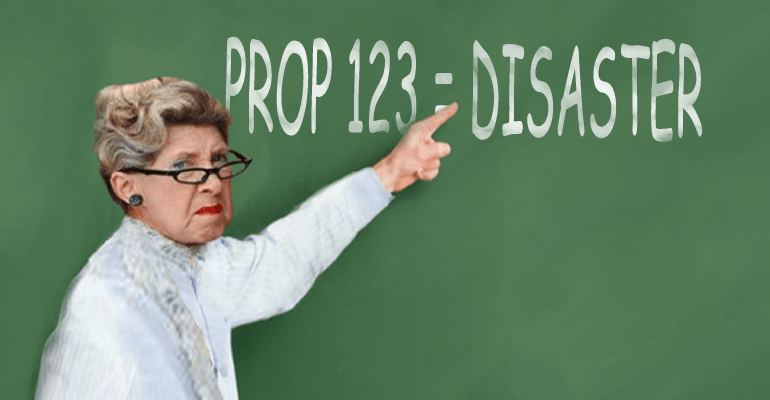
Just as then state treasurer Jeff Dewit predicted in 2016, Prop 123 will be tied up in court for years. Regardless of how the question of legality is resolved by the courts, one fact is absolutely clear. Prop 123 violates both the letter and the spirit of the state lands trust as intended in our enabling act.
There are three parties to every trust: the trustor, in this case the federal government; the trustee, in this case the AZ board of investment, and the beneficiary, in this case present and future common school students. Since the whole idea of having trusts is to preserve the intentions of the trustor regarding the distribution of the trust assets to the beneficiaries, trusts are inherently difficult if not impossible to change without the consent of all three parties. In this case, even congress can not lawfully change the terms of the trust without the consent of the other two parties. Furthermore, consent from beneficiaries is impossible to obtain because they consist of not only present, but also future common school students. Think about it, current beneficiaries were not born when the trust was created. Likewise, future beneficiaries are not born yet.
But the saddest aspect of this controversy is that data found in reports from two non-partisan government agencies indicate that Prop 123 was totally unnecessary in 2016 and is still unnecessary in 2019.
These two agencies are:
The AZ Joint Legislative Committee
https://www.azleg.gov/jlbc/gfhistoricalspending.pdf
The Arizona Auditor General
https://www.azauditor.gov/sites/default/files/19-203_Report_With_Pages.pdf
Whenever proponents of unlimited education funding are asked how much funding will be enough, they always dodge the question by answering with one of two talking point replies. One of those is that we need to restore funding to pre-recession levels. In fact, as late as October 1, 2019 the AZ Central quoted the AZ superintendent of public instruction as follows:
“State Superintendent of Public Instruction Kathy Hoffman wrote in a statement that Prop. 123 funds ‘will continue to flow to Arizona schools until funding expires in 2025.’
‘The next step our state must take is finding a sustainable revenue source that will fully restore education funding to pre-recession levels,’ she wrote”.
The other argument for continued increases in education funding is that we are not maintaining the mandate that funding be increased according to inflation.
The question of whether those two arguments are true or false may be resolved by looking at the history of education funding, as stated on the following table:
| FISCAL YEAR | FUNDING IN BILLIONS |
| 2000 | 3.61 |
| 2001 | 3.85 |
| 2002 | 3.91 |
| 2003 | 3.54 |
| 2004 | 3.88 |
| 2005 | 4.31 |
| 2006 | 4.99 |
| 2007 | 5.52 |
| 2008 | 5.72 |
| 2009 | 4.75 |
| 2010 | 4.23 |
| 2011 | 4.62 |
| 2012 | 4.36 |
| 2013 | 4.44 |
| 2014 | 4.68 |
| 2015 | 4.88 |
| 2016 | 5.12 |
| 2017 | 5.08 |
| 2018 | 5.29 |
| 2019 | 5.80 |
| 2020 | 6.43 |
Considering that FY2020 education funding is $6.43 Billion versus the pre-recession FY2008 level of $5.72, Huffman’s October 1 statement on the AZ Central is obviously false and misleading. Was this the result of ignorance, or malice? Since she is the superintendent of public instruction, and knows or should now these figures, it is very likely that it was not the result of ignorance.
Furthermore, the pre-recession funding level was out of line because it was excessively high. Funding in FY2005, FY2006, and FY2007 saw increases of 11.08%, 15.18%, and 10.62%, respectively. These unreasonably high funding increases took place under the cloud of an impending economic downturn. Even after the recession had begun, there was a funding increase of 3.62% in FY2008.
Therefore, the demand that funding be brought to the FY2008 level is totally unreasonable. Even so, we have already surpassed that level and are scheduled to continue huge increases over the next few years.
The other question that these numbers answer is whether education funding has kept pace with inflation. The obvious answer is that it definitely has.
Also, let us not forget that education spending consumes well over half of our state budget, leaving less than half to meet all other obligations.
In light of all this, the members and supporters of the education cabal should be thanking the state legislature for the huge amount of support they have provided, especially in recent years, instead of bitching and moaning about inadequate funding, demanding ever increasing funding hikes, and creating bogus schemes like Proposition 123.
[metaslider id=178468]
